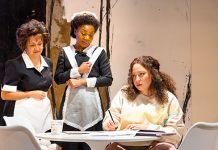By Joan Ellis
Hope Springs tosses its audience back and forth between laughter and despair. At least we’re in the hands of experts for the tussle.

You may remember this movie as the opening announcement that the Boomer generation is now confronting the traditional problems of late middle age. Kay (Meryl Streep) and Arnold (Tommy Lee Jones), with children grown and gone, face the inevitable moment when couples look across the table and wonder, “Is what we have left still enough?” The breakfast table scene – one fried egg and bacon with silence – tells us everything we need to know about this one-note story: ritual maintenance of an empty existence.
Married for 31 years, Kay and Arnold are sleeping in the separate bedrooms that became their retreats after Arnold’s surgery five years ago. They’re living in a marriage without physical or emotional expression – Arnold in a state of passive acceptance, Kay alternately hurt and sad. She has saved a pamphlet from Hope Springs, Maine, that invites troubled couples to come to the offices of Dr. Feld. “Come for a week and refresh your marriage,” it says. After many scenes of Arnold’s grumping and Kay’s imploring, they leave for Hope Springs.
Dr. Feld (Steve Carell, playing gently against type) orders up an unsettling series of exercises designed to save the marriage with sex. The balance of the movie is about the couple’s acute discomfort as they navigate these rough waters.
For Kay and Arnold, the mere sight of a double bed is a threat, a sleeping tiger waiting to pounce. For the audience, sex is just one of the broken elements in this marriage. Their often pathetic efforts to carry out Dr. Feld’s homework assignments become the drivers of both the comedy and the sadness. The Rx – restoration through sex – becomes a question mark.
So how is it that the movie works as well as it does? Simple: Meryl Streep and Tommy Lee Jones – with a nice assist from Steve Carell.
For an actress gifted in the art of subtlety, the role of a dutiful suburban housewife of a grump must be a daunting challenge of restraint. Streep manages to convey it all without once resorting to mugging. By instinctively buttoning two buttons on her cardigan on the therapist’s couch she reveals her awkward discomfort with his solutions. With just the slightest changes of expression she creates Kay’s desperation in her cage of isolation.
Jones is masterful in creating an accountant who long ago settled for golf and television as substitutes for feeling anything. As he lies in his recliner, soaking in his own petulance, Jones’ Arnold is a man who might split open if someone lanced the infection.
A facile ending caps the comedy neatly, but the grim questions they have raised about long-term marriage beg for more attention. Let’s hope they get to the real heart of the matter in Part II. Meanwhile, we can suffer and laugh in the uncomfortable confusion created by two great performers.
Rated PG-13
Joan Ellis’ address on the Internet, which contains her review library, is JoanEllis.com.














